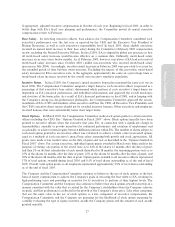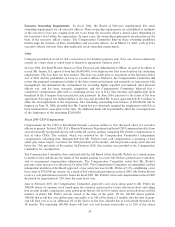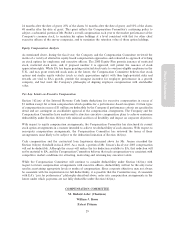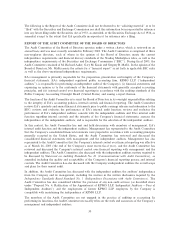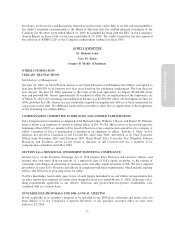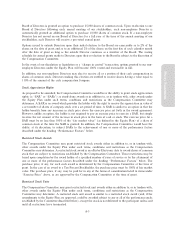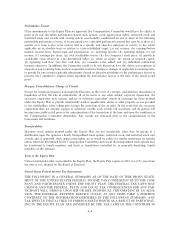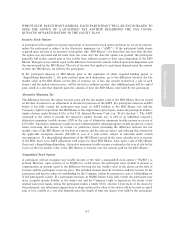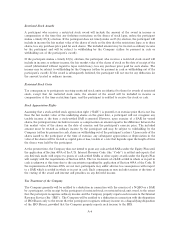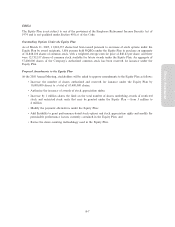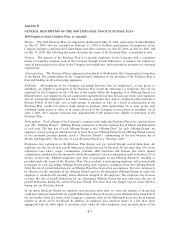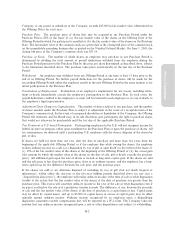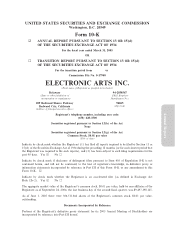Electronic Arts 2005 Annual Report Download - page 49
Download and view the complete annual report
Please find page 49 of the 2005 Electronic Arts annual report below. You can navigate through the pages in the report by either clicking on the pages listed below, or by using the keyword search tool below to find specific information within the annual report.
WHICH SUCH PARTICIPANT RESIDES. EACH PARTICIPANT WILL BE ENCOURAGED TO
SEEK THE ADVICE OF A QUALIFIED TAX ADVISOR REGARDING THE TAX CONSE-
QUENCES OF PARTICIPATION IN THE EQUITY PLAN.
Incentive Stock Options
A participant will recognize no income upon grant of an incentive stock option and incur no tax on its exercise,
unless the participant is subject to the alternative minimum tax (""AMT''). If the participant holds shares
acquired upon exercise of an incentive stock option (the ""ISO Shares'') for more than one year after the date
the option was exercised and for more than two years after the date the option was granted, the participant
generally will realize capital gain or loss (rather than ordinary income or loss) upon disposition of the ISO
Shares. This gain or loss will be equal to the diÅerence between the amount realized upon such disposition and
the amount paid for the ISO Shares. The rate of taxation that applies to capital gain depends upon the amount
of time the ISO Shares are held by the participant.
If the participant disposes of ISO Shares prior to the expiration of either required holding period (a
""disqualifying disposition''), the gain realized upon such disposition, up to the diÅerence between the fair
market value of the ISO Shares on the date of exercise (or, if less, the amount realized on a sale of such
shares) and the option exercise price, will be treated as ordinary income. Any additional gain will be capital
gain, taxed at a rate that depends upon the amount of time the ISO Shares were held by the participant.
Alternative Minimum Tax
The diÅerence between the option exercise price and the fair market value of the ISO Shares that are vested
on the date of exercise is an adjustment to income for purposes of the AMT. If a participant exercises an ISO
Proxy Statement
before it has fully vested, the participant may incur an AMT liability as the ISO Shares vest and the
Company's right to repurchase the ISO Shares at the original issue price lapses, unless the participant makes a
timely election under Section 83(b) of the U.S. Internal Revenue Code (an ""83(b) election''). The AMT
(imposed to the extent it exceeds the taxpayer's regular income tax) is 26% of an individual taxpayer's
alternative minimum taxable income (28% in the case of alternative minimum taxable income in excess of
$175,000). Alternative minimum taxable income is determined by adjusting regular taxable income for certain
items, increasing that income by certain tax preference items (including the diÅerence between the fair
market value of the ISO Shares on the date of exercise and the exercise price) and reducing this amount by
the applicable exemption amount ($45,000 in case of a joint return, subject to reduction under certain
circumstances). If a disqualifying disposition of the ISO Shares occurs in the same calendar year as exercise
of the ISO, there is no AMT adjustment with respect to those ISO Shares. Also, upon a sale of ISO Shares
that is not a disqualifying disposition, alternative minimum taxable income is reduced in the year of sale by the
excess of the fair market value of the ISO Shares at exercise over the amount paid for the ISO Shares.
NonqualiÑed Stock Options
A participant will not recognize any taxable income at the time a nonqualiÑed stock option (""NQSO'') is
granted. However, upon exercise of an NQSO for vested shares, the participant must include in income as
compensation an amount equal to the diÅerence between the fair market value of the shares on the date of
exercise and the participant's exercise price. The included amount must be treated as ordinary income by the
participant and may be subject to withholding by the Company (either by payment in cash or withholding out
of the participant's salary). If a participant exercises an NQSO before it has fully vested, the participant may
incur a regular income liability as the shares vest and the Company's right to repurchase the shares at the
original issue price lapses, unless the participant makes a timely 83(b) election. Upon resale of the shares by
the participant, any subsequent appreciation or depreciation in the value of the shares will be treated as capital
gain or loss, taxable at a rate that depends upon the length of time the shares were held by the participant.
A-5


